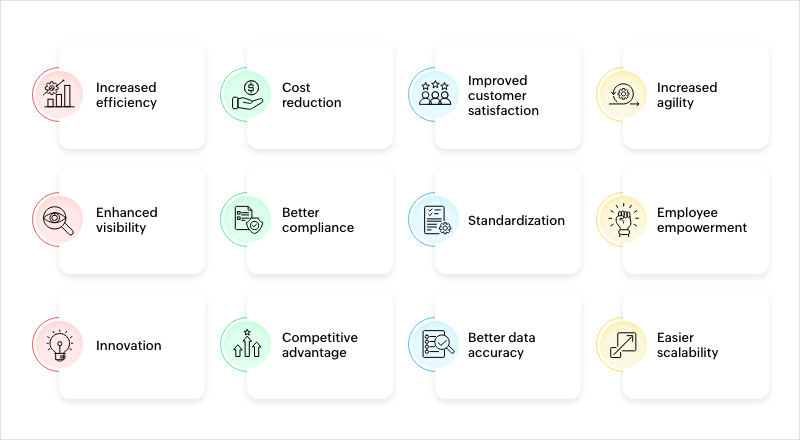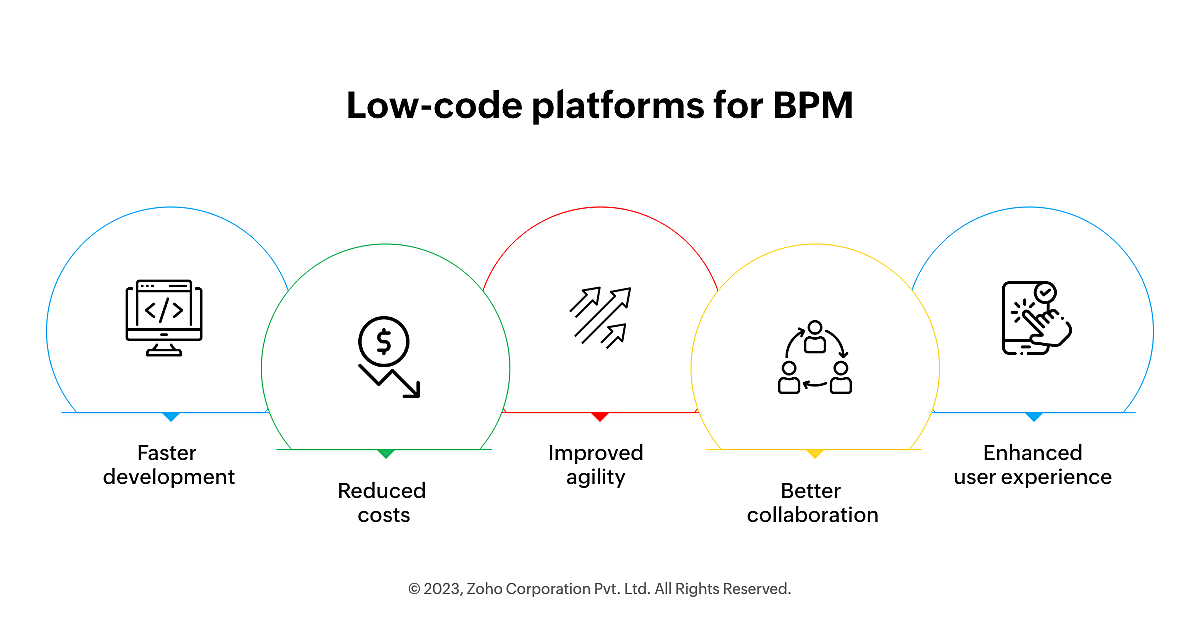- HOME
- Know Your Tech
- 12 reasons why business process management is crucial for your organization
12 reasons why business process management is crucial for your organization
- Last Updated : November 12, 2025
- 4.2K Views
- 7 Min Read
TL;DR: Managing a business gets messy when processes are all over the place. Business process management (BPM) helps fix that by streamlining how things get done. From faster decision-making to easier scaling and better compliance, BPM gives you the tools to run a smoother, smarter operation. And with low-code platforms like Zoho Creator, setting up and tweaking these processes doesn’t need a full tech team. It’s quicker to build, easier to manage, and way more flexible as your business grows.
Running a successful business can be like conducting an orchestra. With so many moving parts and players to manage, it's easy to play off-key and out of sync. That's where business process management (BPM) comes in. BPM provides the sheet music that guides your organization's movements and keeps everyone in tune.
BPM is a systematic approach that helps you streamline and optimize business processes from start to finish. It can involve the implementation and adaptation of software, strategies, procedures, or even roles within the company. By identifying inefficiencies and areas for improvement, a business process management system can eliminate bottlenecks, improve process management, increase operational efficiency, and reduce costs, giving your business the power to outpace the competition. Whether you're in manufacturing, healthcare, retail, or any other industry, BPM can help you take your business to the next level by enhancing your business processes.
And organizations are implementing business process management software at a remarkable rate:
Gartner has estimated that the global BPM market would grow at a CAGR of 8.2% from 2020 to 2027, reaching USD 16.9 billion by 2027.
It has become increasingly important for companies to incorporate business process management into their daily business operations.
So, in this blog post, we'll discuss the importance of business process management and how it benefits organizations. Let's dive in!
Importance of business process management for your organization

1. Increased efficiency
Business process management helps organizations improve efficiency, reduce waste, and achieve sustainable success. For instance, a retail business can automate and streamline its inventory management system by using sensors to detect inventory levels and update their database in real time. This minimizes the risk of stockouts and overstocks and frees up employees to focus on other important tasks.
2. Cost reduction
In today's highly competitive business environment, reducing costs without sacrificing quality or productivity is essential. With BPM software, a manufacturing company can optimize its procurement process, allowing it to identify the most efficient suppliers and negotiate better prices by analyzing historical purchasing data.
3. Improved customer satisfaction
Business process management enhances customer satisfaction by helping brands deliver high-quality customer experiences. By enabling companies to deliver products and services quicker and more accurately, BPM can lead to improved efficiency, customer experience, and, potentially, more repeat business.
4. Increased agility
Business process management helps businesses navigate the ever-changing business landscape and stay ahead of the competition. For example, a financial services company can expedite its loan approval process by analyzing loan application data in real time and automating the approval process.
5. Enhanced visibility
By providing organizations with greater process visibility, BPM helps identify bottlenecks and areas for improvement. For instance, a logistics company can track each order's progress in real time and identify delays or issues in its order tracking process, so it can take corrective action promptly.
6. Better compliance
Ensuring compliance with regulations and internal policies is critical for companies in industries like finance, healthcare, and manufacturing. Business process management can help organizations achieve compliance and avoid hefty fines, legal penalties, and reputational damage.
For example, a retail company can automate its compliance processes with Payment Card Industry Data Security Standards (PCI DSS) using BPM software, monitoring payments in real time and ensuring compliance with regulatory requirements.
7. Standardization
Whether you run a small business or a large enterprise, business process management can help you standardize your processes to achieve your business goals. For instance, a manufacturing company can ensure its products are of consistent quality, regardless of the location where they're produced.
8. Employee empowerment
Business process management empowers employees with the tools and information they need to be motivated, productive, and innovative. For example, providing customer service representatives with real-time data on customer interactions helps them understand customer needs and respond to questions and complaints more effectively.
9. Innovation
Today, innovation is a key driver of success. By continuously innovating and undergoing business transformation, companies can improve existing processes, fulfill customer needs, and drive revenue growth to remain competitive. For example, a manufacturing company can leverage new technologies to monitor its production process instantly and identify opportunities for optimization.
10. Competitive advantage
Providing companies with real-time data and insights enables them to make informed decisions and quickly adapt to changing market conditions. For instance, a logistics company can leverage business process management to optimize its core business processes and gain a competitive edge by reducing costs, improving delivery times, and enhancing customer experiences. This could involve analyzing and redesigning workflows, implementing technology and automation, and improving supply chain visibility.
11. Better data accuracy
Business process management can significantly improve the accuracy and reliability of business data. When tasks are automated and workflows are standardized, organizations can minimize human error and maintain consistent records. For example, a healthcare provider can use BPM to log patient information across systems automatically, ensuring that every department has access to accurate and up-to-date data, which leads to better diagnosis, treatment, and patient outcomes.
12. Easier scalability
As a business grows, managing increased workloads and onboarding new employees can be challenging. BPM enables smoother scalability by creating structured, repeatable processes. For instance, a growing IT services firm can automate its employee onboarding process—ensuring new hires receive the necessary tools, training, and access without disrupting ongoing operations. This allows the business to scale smoothly while maintaining productivity and consistency.
Overall, BPM is a critical tool for organizations looking to optimize their business operations and achieve their strategic goals.
Learn all about business process management here.
What about business process automation?
Business process automation (BPA) is the use of technology and software to streamline and automate repetitive, manual, and time-consuming tasks and processes within an organization. The primary goal of BPA is to improve efficiency, reduce human error, enhance productivity, and ultimately save time and resources.
How is BPA different from BPM?
Business process automation and business process management differ in scope and purpose. BPA focuses on automating manual tasks or specific processes to increase efficiency, reduce human error, and save time. It is tactical and primarily concerned with automation.
In contrast, BPM encompasses the entire process lifecycle, including design, execution, monitoring, and optimization, with a strategic focus on aligning processes with overall business goals. BPM is a broader, more comprehensive approach that aims to improve organizational performance metrics through process management and automation.
How can low-code simplify business process management?
Low-code platforms simplify business process management by helping organizations design, implement, and manage business processes without extensive coding or programming expertise. With low-code platforms, users can drag and drop prebuilt components to create process workflows, reducing the time and effort needed to build and maintain complex business process models.

Specific ways low-code platforms can simplify BPM
Faster development
Low-code platforms offer a library of prebuilt components, templates, and integrations for users to build business-based applications faster than they would with traditional coding methods. These are designed specifically for business process automation, so users can easily align their business processes. It saves the time needed in creating components from scratch, increases productivity, and improves operational efficiency by making process management quicker.
Reduced costs
Low-code platforms can be deployed with fewer resources and less coding expertise, reducing development and maintenance costs. It enables companies to allocate resources more effectively and helps them improve customer satisfaction. When business processes evolve or regulatory requirements change, organizations can modify applications visually. This reduces the need for extensive regression testing and costly maintenance efforts associated with traditional coding.
Improved agility
With low-code, optimizing business processes is easier. Organizations can quickly modify or update the business strategy as needed, responding to changing business requirements and customer demands. Low-code platforms allow process designers to make quick modifications to business processes with the help of visual builders. When a change is needed, such as altering the flow of a business process, adding new steps, or updating decision logic, users can make these adjustments swiftly for better business outcomes.
Better collaboration
With a user-friendly visual interface, low-code leads to better collaboration and communication between teams. They provide an intuitive, drag-and-drop visual interface that allows both technical and nontechnical users to participate in the process optimization. Many low-code platforms offer real-time collaboration features, that let team members work together within the platform, sharing ideas, making changes, and providing feedback instantly. This streamlines communication, better understanding, and decision-making, preventing delays caused by email exchanges or meetings.
Enhanced user experience
With prebuilt user interfaces, you can improve the customer experience and reduce the time required to train employees on new processes. Low-code platforms enable organizations to create user-friendly self-service portals to simplify task management and help users access information independently. This increases performance and the overall business process.
Low-code platforms as business process management software
In a nutshell, low-code BPM platforms lead to efficient business processes, improved productivity, and better customer satisfaction.
Don't wait any longer to place your organization at the forefront of innovation and maximize your business process management initiative. Zoho Creator's BPM software empowers you to automate business processes, improve business efficiency, identify areas for process improvement, and leverage new technologies. Start building process-based applications, automating repetitive tasks, and managing your data more efficiently today!
 Syed Kamaluddin H
Syed Kamaluddin HSyed is a product marketer at Zoho Creator who is passionate about staying up-to-date with the latest trends in the industry. At work, he strives to promote low-code. Outside of work, Syed is a versatile individual who enjoys writing poetry in Urdu, exploring new destinations, and engaging in physical activities to maintain his health.



